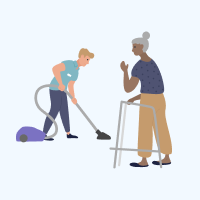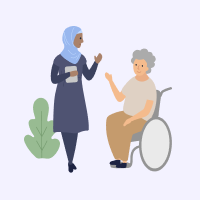As you grow older, the chances of experiencing difficulties with hearing, vision or oral health may increase. Things that may have been easy in the past, such as reading signs clearly while driving or taking part in a conversation in a shopping centre, may become more challenging.
If someone you are caring for is experiencing hearing, vision or oral health difficulties, there are services that can help. For more detailed information, follow:
Tips for caring for someone with poor hearing
While some hearing loss is considered normal as you get older, people are more likely to have hearing problems if they are over 55 years of age.
If the person you care for is over 65 years of age, it is recommended that they have their hearing tested every year. You can talk to their doctor about getting a test.
When caring for someone with poor hearing, it’s important to:
- make sure you have their attention and stand in front of them when speaking
- look at the person as you speak
- speak slowly and clearly, but do not over-emphasise or distort your lip movements as this can make it hard for people to read your lips
- not shout – although sometimes you may need to speak louder
- remember that shouting can make it hard for people to lip-read
- use body language and facial expressions when you speak to help give some context to the person you are speaking to
- write messages so they can read them
- remember that beards, moustaches, chewing and putting hands in front of your face can obscure communication
- avoid talking in a noisy environment, or try to reduce background noise when possible
- speak directly to the deaf person and not to the interpreter if an Auslan (sign language) interpreter is present
- make sure that hearing aids are functioning, being used properly and checked regularly
- install visual smoke detectors in the house
- investigate other visual alerts such as alarm clocks and front door alerts
- install assistive-listening devices such as volume-controlled phones for contacting people in an emergency.
What services can help?
If someone you are caring for is having difficulties with their hearing, the first step is to see a doctor. The GP may refer them to another health professional, such as an audiologist or audiometrist.
They may also be eligible to access subsidised hearing services through the Australian Government Hearing Services Program. Visit the Hearing Services Program website to find out more.
The National Sign Language Program (NSLP) provides free sign language interpreting and captioning services through Deaf Connect.
If the person you care for is over 65 years of age, they can access the NSLP to engage with aged care services and take part in professional and social activities.
From 1 July 2024, the program will also allow them to access free sign language interpreting and captioning services for health and medical appointments that have a Medicare rebate.
Tips for caring for someone with vision loss
After the age of 40, the risk of eye diseases and vision problems increases drastically. People with vision problems can get depression and have an increased risk of falls and hip fractures.
When caring for someone who has vision problems:
- say your name when you arrive
- use a clear natural voice when speaking
- say what you’re doing if you’re moving about the room or leaving
- tell them if there’s food in front of them, including what it is and where it’s placed on the plate, perhaps using the idea of a clock face (for example, beans are at 12 o’clock)
- warn the person about the temperature of food or drink when you’re giving it to them
- leave everything as you found it in their home. If you need to move something, tell them where you have moved it to
- be especially careful when the house is being cleaned. Vacuum cords, wet floors and a mop and bucket are all potential tripping hazards
- shut doors completely or leave them fully open. A half-open door is a hazard
- let them take your arm and walk slowly, and make sure you remove or describe any obstacles in their way when guiding them around.
What services can help?
Regular eye tests may help detect problems early, which can improve chances of receiving effective treatment and support. Eye testing by an optometrist is covered under Medicare. Read more on services that are subsidised by the Government on the Medicare Benefits Schedule website.
You can also visit the Australian Government's healthdirect website to read more eye health tips for people over 60.
Tips for caring for someone with oral health problems
Maintaining a high standard of oral health can become increasingly difficult as you grow older. When caring for an older person, it’s important to make sure they continue to look after their oral health.
Help them do this by making sure they:
- visit the dentist as recommended for their dental condition and age to check for dental disease and more serious diseases of the mouth
- tell the dentist about any general health problems and medications they are taking as this may affect their dental health and treatment
- brush their teeth twice a day, especially after meals, and use dental floss to remove plaque which causes gum disease
- use a fluoride or sensitive toothpaste
- eat a healthy, balanced diet and avoid sweet foods and drinks between meals
- clean their mouth and/or dentures well each day and have both checked regularly by the dentist.


